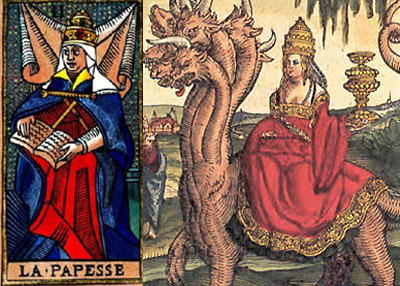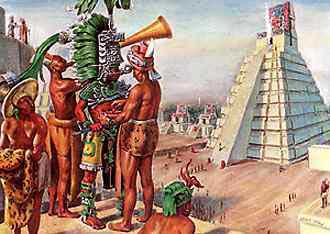
“Whenever you see a legend, you can be sure,If you go to the very bottom of things, that you will find history”Vallet de Viriville
 Pope Joan is the name of a female pope (also La Papessa) who supposedly reigned for less than three years in the 850s, based on a legend that circulated in the Middle Ages. Pope Joan is regarded by most modern historians and religious scholars as fictitious, possibly originating as an anti-papal satire.
Pope Joan is the name of a female pope (also La Papessa) who supposedly reigned for less than three years in the 850s, based on a legend that circulated in the Middle Ages. Pope Joan is regarded by most modern historians and religious scholars as fictitious, possibly originating as an anti-papal satire.Born in Britain 818, studied philosophy in Athens, moved to Rome and entered the priesthood gained reputation as a brilliant scholar and won a university chair appointed a Cardinal by Pope Leo IV and upon his death in 853 was elected Pope. Pope John VIII
POPE JOAN ruled the Roman Catholic Church from 853 to 855. Pope Joan had a private chamberlain named “Florus”. One day, while “On Procession” down one of the streets of Rome, she gave birth prematurely to their son.

The citizens of Rome were so enraged at the deception – John was in reality Joan – that they tied their Pope to the tail of her horse and dragged her through the streets of Rome. They then stoned her and her infant son to death.
The next day a “monument” to the event, a pile of stones, was erected on the spot the Pope “dropped” her baby. The monument remained until the following Pope got tired of having to detour around “the embarrassment”.
The history of Pope John (Joan) has been acknowledged by over 150 church historians of the Middle Ages.To “cover” history Pope Leo’s death was moved back two years to 855 by the Vatican.
Ever since the death of Pope Joan all of the candidates for Pope have had to submit to an examination to insure the candidate is a man – not a eunuch, and not a WOMAN.
Pope Clement VIII, in the 17th Century, ordered all records of Pope Joan destroyed. He realized that if the Papal chain were broken it would destroy the myth that claims that the Papalhood descended from St. Peter to the current Pope in an unbroken line. If the line is broken the whole project is a sham!
In 1886 Greek author Emmanuel Royadis was excommunicated for writing his book “Pope Joanna”.
( 1998 research indicates that in all probability the “man” known in history as “The Englishman – John of Mainz” was indeed SHE )
In the year 1965 I, Donald F. Dutkowski, was walking the streets of Rome with a Doctor Arduini. We came upon the intersection where the “monument”, the pile of stones, once stood. This born in Rome, Roman Catholic, told me the story of Pope Joan. This FACTUAL EVENT lives on in the memory of the citizens of Rome.

"Variously known as the sedia stercoraria – which translates as the 'dung chair'– or rather more understandably, as the 'pierced chair', this then was the object used to test the sex of newly installed popes... Any candidate chosen by his peers to occupy the papal throne was required, before his election could be verified, to sit on this elaborate seat while a young cardinal took advantage of the design to touch his testicles." .
 Original Caption: "The sedia stercoraria in the Vatican Museum. It is kept in a small room with no mention of its infamous past role
Original Caption: "The sedia stercoraria in the Vatican Museum. It is kept in a small room with no mention of its infamous past role
Original Caption: "An illustration that accompanied an account by the Swedish traveller Lawrence Banck, of the coronation in 1644 of Pope Innocent X. Innocent is seated in the sedia stercoraria and having his testicles felt by a young cardinal as a way of ensuring that he is a man." The man appears to be exclaiming in Latin, "The pontiff has them," much to the relief of everyone.
Medieval eyewitness accounts give no doubt that at one time, this chair and others like it were indeed an important part of the papal coronation ritual. But why should the cardinals be so concerned that they would go through the embarrassment of publicly probing their new boss to demonstrate that the pope is indeed a male? (It wasn't done quietly, either. If all was as expected, the examining cardinal was supposed to call out, "He has two balls, and they are well hung.") An odd tradition even for such a woman-hating church as that of Rome – unless, of course, they had good reason to worry. Unless, that it, there once was a pope who wasn't a member of the boys' club.



